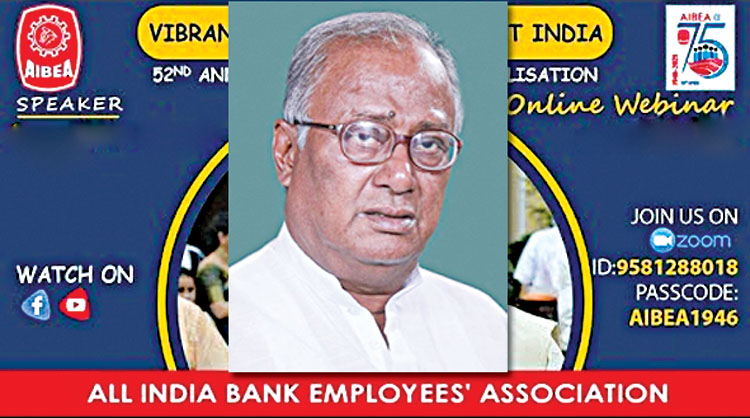New Delhi, Jul 18 (Mayank Nigam) Stating that the problems of Public Sector Banks (PSBs) are the piling bad loans and if it is privatised it will not be able to take care poor people, Former Minister and All India Trinamool Congress (AITC) Lok Sabha MP Prof Saugata Roy said. However, the government instead of enacting methods to recover the bad loans, has introduced Insolvency and Bankruptcy Code (IBC) that favoured only the corporate defaulters and banks had to suffer huge write-offs in the name of “hair-cuts”, he said while delivering his lecture, on the 17th day of the month-long AIBEA National Webinars to commemorate the 52nd anniversary of Bank Nationalisation on theme ‘Vibrant Banking for Vibrant India’ and focus ‘people’s money for people’s Welfare’, on Saturday night.
He said the Central government is not disclosing the names of the willful corporate defaulters. However, AIBEA has disclosed their names more than once and added all banks are doing well but for the corporate bad loans. However, the government is trying to privatise the PSBs, disinvest LIC and to privatise one General Insurance Company, he added. Prof Roy said at present, banking system has 12 public sector banks and many private banks besides the cooperative banks and regional rural banks. The government has been introducing social schemes but they have been implemented in full by only the public sector banks. Jan Dhan Yojana, Mudra etc., are examples of such schemes.
What is the road ahead? The Government of India has taken a decision to privatise two public sector banks. But, we have to fight against the privatisation of banking system. We know the case of Mehul Choksi, Nirav Modi and how they cheated Punjab National Bank. We also know the case of Vijay Mallya, who cheated State Bank of India, IDBI Bank and other public sector banks. We also know about the involvement of Chanda Kochchar and it speaks amply about the functioning of private sector banks. the senior AITC leader said. Conveying his best wishes to the members of AIBEA, he said that AIBEA has been the prime organisation of bank employees, being its prime mover in improving their service conditions and also highlighting the ills afflicting the banking industry. Since its foundation, it started demanding and agitating for the nationalisation of banking sector. After 23 years of struggles, on July 19, 1969, 14 major banks were nationalised, the former Union Minister said. He nostalgically recalled the days when he was a student union leader in Congress in 1969 and how they took to streets to celebrate the Nationalisation of banks.
Now, after 52 years, the branch network has expanded exponentially, deposits and advances increased in an exemplary manner since Nationalisation. Prof Roy said when the public sector banks were the major players till 1991 when India embraced liberalisation policies and the Government of India brought the amendment to Banking Regulation Act to disinvest its holding in the public sector banks till 51%. But, when the Vajpayee-led NDA government tried to reduce its stake upto 33%, there was protests everywhere and ultimately with the defeat of BJP-NDA government in 2004, the bill had been lapsed. The credit given to agriculture, priority sector from the public sector banks is well known while the private sector banks eye only on profits. The social banking is possible only through public sector banks. When FRDI Bill was brought in, AIBEA appeared before the Standing Committee on Finance, and explained in detail about the ills of the Bill that was ultimately withdrawn. He said that in the fight against privatisation, he and his party AITC would be supporting AIBEA. The stalwarts, who spoke in favour of Nationalised banks and who opposed privatisation attempts, for example, former Lok Sabha MP Gurudas Dasgupta, on the floor of Parliament. Many of the new Members of Parliament do not know about how the public sector banks helped to improve the economy of the country especially in rural areas. Prof Saugata Roy said that fight is the only alternative and said with the support of people of the country and progressive political parties, AIBEA would emerge victorious in the fight against privatisation.

